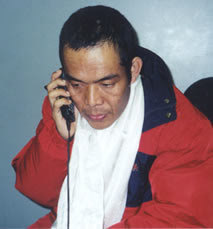
Ngawang Choephel makes a phone call immediately after arriving in the US. The first person he wanted to speak to was his mother, Sonam Dekyi, in India.
The 36-year-old Tibetan exile attended Middlebury College in Vermont as a Fulbright scholar in 1993 and 1994. In 1995, Mr. Choephel returned to Tibet to film a documentary on traditional performing arts where he was imprisoned by the Chinese government for engaging “in separatist activities.”
Tibetan advocacy groups, human rights organizations, parliamentarians and several governments have vigorously pressed for Mr. Choephel’s release. In response to repeated inquiries about his well being from the Vermont delegation of the U.S. Congress, the Chinese Embassy reported in October 1999 that Mr. Choephel had been suffering serious medical ailments.
“The campaign for Ngawang Choephel’s medical parole has ended successfully today in a clear vindication of the world-wide efforts of so many to help secure his release,” said John Ackerly, President of the International Campaign for Tibet.
Mr. Choephel is the first high-profile Tibetan prisoner to be issued early release, although a number of Chinese political prisoners have been released or granted medical parole, usually prior to a major diplomatic event. Mr. Choephel’s release comes fewer than five weeks before President Bush’s State visit to Beijing, scheduled for February 21 and 22, and as the international community is examining China’s human rights record in advance of the annual UN Human Rights Commission meeting in Geneva beginning on March 20.
Mr. Choephel arrived in Detroit on Sunday, January 20, at 10:48 am and walked off of Northwest flight number 88 from Beijing with an American diplomat. He was met by an official of the State Department and released into the care of representatives of the International Campaign for Tibet, which will look after his immediate needs including his health requirements. The Department of State had made arrangements for the arrival of Mr. Choephel through the Office of the Special Envoy of His Holiness the Dalai Lama. Mr. Choephel is traveling on a U.S. tourist visa and has been officially released to India via the United States.
“The International Campaign for Tibet welcomes the release of Ngawang Choephel and we are happy for his mother, Sonam Dekyi, who has hoped and worked tirelessly for his release,” said Ackerly.
“But we also want to reiterate that while Ngawang Choephel was a political prisoner, he was not a political figure. There are still hundreds of Tibetan political prisoners including Chadrel Rinpoche, Ngawang Sangdrol, Tanak Jigme Sangpo and the Panchen Lama — one of the world’s youngest political prisoners — imprisoned by China for their beliefs or often non-violently standing up for basic freedoms and rights for Tibetans.”
“We are encouraged by the resolution of Ngawang Choephel’s case, but we will continue to call on the government of the People’s Republic of China to take systematic and structural steps to improve human rights in Tibet,” said Ackerly.

